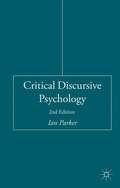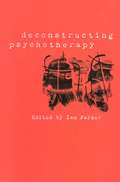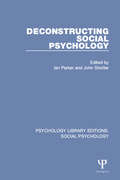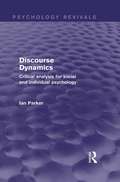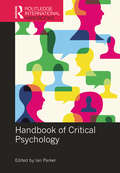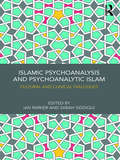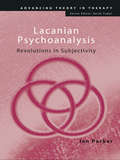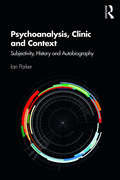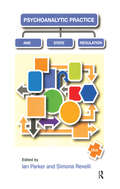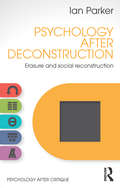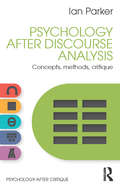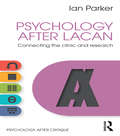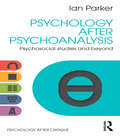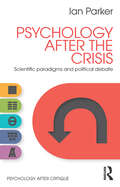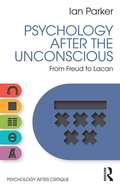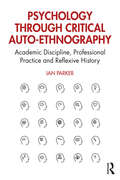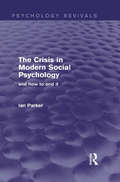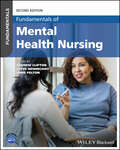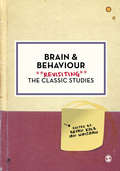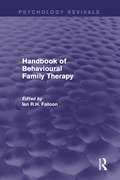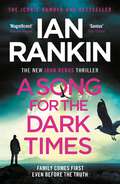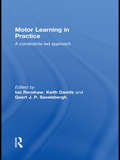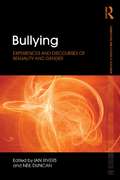- Table View
- List View
Critical Discursive Psychology
by Ian ParkerCritical Discursive Psychology addresses issues in critical discursive research in psychology, and outlines the historical context in the discipline for the emergence of qualitative debates. Key critical theoretical resources are described and assessed and a series of polemics is staged that brings together writers who have helped shape critical work in psychology. It also sets out methodological steps for critical readings of texts and arguments for the role of psychoanalytic theory in qualitative research.
Deconstructing Psychotherapy (Perspectives On Psychotherapy Ser.)
by Ian Parker`I enjoyed this book, and think that it should find a grateful and attentive readership in the practical field as well as being a central text in academic settings. It will also be well received by those, like myself, for whom the interest is more in deconstructing than psychotherapy' - Dialogues This book takes the discursive and postmodern turn in psychotherapy a significant step forward and will be of interest to all those working in mental health who are concerned with challenges to oppression and processes of emancipation. It achieves this by: reflecting on the role of psychotherapy in contemporary culture; developing critiques of language in psychotherapy that unravel its claims to personal truth; and the reworking of a place in the transformative therapeutic practice. Deconstruction is brought to bear on the key conceptual and pragmatic issues that therapists and clinical psychologists face, and the project of therapy is opened up to critical attention and reconstruction. The book provides clear reviews of different viewpoints and will help readers to understand the complex terrain of debates.
Deconstructing Social Psychology (Psychology Library Editions: Social Psychology)
by Ian Parker John ShotterSince the early 1970s, social psychology has been in crisis. At the time Reconstructing Social Psychology (Armistead) provided a critical review of theories and assumptions in the discipline. Originally published in 1990, this title not only updates that review but illustrates the ways in which assumptions had changed at the time. The crisis is no longer seen as one which can be resolved within social psychology itself, but rather as one more deeply rooted in modern society. The contributors look at the issues raised by deconstruction in the other human sciences, as well as investigating the claims made by social psychology as a discipline. They examine the rhetoric and texts of social psychology, analysing how the texts which hold the discipline together obtain their power. The arguments include the political implications of deconstructive ideas, focusing on particular issues such as research, therapy and feminism. Deconstructing Social Psychology presents a strong selection of new critical writing in social psychology. It will still be a useful text for students of psychology, social science, and sociology, and for those working in the area of language.
Discourse Dynamics: Critical Analysis for Social and Individual Psychology (Psychology Revivals)
by Ian ParkerWhat are discourses? Are discourses ‘real’, and what is real outside language? In this book, originally published in 1992, Ian Parker provides one of the clearest and most systematic introductions to discourse research and the essential theoretical debates in the area. At the time it was one of the few texts to defend a realist position, discuss accounts of postmodernity and set out criteria for the identification of discourses. Discourse Dynamics is essential reading to anyone interested in project research and an understanding of the theoretical issues involved in discourse analysis. The book will also be of use to students other than those studying psychology. It addresses the concerns of all those looking at qualitative textual research in the human sciences and is still very much relevant today.
Handbook of Critical Psychology (Routledge International Handbooks)
by Ian ParkerChoice Recommended Read Critical psychology has developed over time from different standpoints, and in different cultural contexts, embracing a variety of perspectives. This cutting-edge and comprehensive handbook values and reflects this diversity of approaches to critical psychology today, providing a definitive state-of-the-art account of the field and an opening to the lines of argument that will take it forward in the years to come. The individual chapters by leading and emerging scholars plot the development of a critical perspective on different elements of the host discipline of psychology. The book begins by systematically addressing each separate specialist area of psychology, before going on to consider how aspects of critical psychology transcend the divisions that mark the discipline. The final part of the volume explores the variety of cultural and political standpoints that have made critical psychology such a vibrant contested terrain of debate. The Handbook of Critical Psychology represents a key resource for researchers and practitioners across all relevant disciplines. It will be of particular interest to students and researchers in psychology, psychosocial studies, sociology, social anthropology and cultural studies, and to discourse analysts of different traditions, including those in critical linguistics and political theory.
Islamic Psychoanalysis and Psychoanalytic Islam: Cultural and Clinical Dialogues
by Ian Parker Sabah SiddiquiThis pioneering volume brings together scholars and clinicians working at the intersection of Islam and psychoanalysis to explore both the connections that link these two traditions, as well as the tensions that exist between them. Uniting authors from a diverse range of traditions and perspectives, including Freudian, Jungian, Lacanian, Object-Relations, and Group-Analytic, the book creates a dialogue through which several key questions can be addressed. How can Islam be rendered amenable to psychoanalytic interpretation? What might an ‘Islamic psychoanalysis’ look like that accompanies and questions the forms of psychoanalysis that developed in the West? And what might a ‘psychoanalytic Islam’ look like that speaks for, and perhaps even transforms, the forms of truth that Islam produces? In an era of increasing Islamophobia in the West, this important book identifies areas where clinical practice can be informed by a deeper understanding of contemporary Islam, as well as what it means to be a Muslim today. It will appeal to trainees and practitioners of psychoanalysis and psychotherapy, as well as scholars interested in religion and Islamic studies.
Lacanian Psychoanalysis: Revolutions in Subjectivity (Advancing Theory in Therapy)
by Ian ParkerJacques Lacan's impact upon the theory and practice of psychoanalysis worldwide cannot be underestimated. Lacanian Psychoanalysis looks at the current debates surrounding Lacanian practice and explores its place within historical, social and political contexts. The book argues that Lacan’s elaboration of psychoanalytic theory is grounded in clinical practice and needs to be defined in relation to the four main traditions: psychiatry, psychology, psychotherapy and spirituality. As such topics of discussion include: the intersection between psychoanalysis and social transformation a new way through deadlocks of current Lacanian debate a new approach to ‘clinical structures’ of neurosis, perversion and psychosis Lacanian Psychoanalysis draws on Lacan's work to shed light on issues relevant to current therapeutic practice and as such it will be of great interest to students, trainees and practitioners of psychoanalysis, psychotherapy, counselling and other domains of personal and social change.
Psychoanalysis, Clinic and Context: Subjectivity, History and Autobiography
by Ian ParkerPsychoanalysis is a strange and mysterious practice. In his new book, Ian Parker offers insights into his own experiences, first as trainee then as analyst, the common assumptions about psychoanalysis which can be so misleading, as well as a map of the key debates in the field today. Beginning with his own history, at first avoiding psychoanalysis before training as a Lacanian, Parker moves on to explore the wider historical development of clinical practice, making an argument for the importance of language, culture and history in this process. The book offers commentary on the key schools of thought, and how they manifest in the practice of psychoanalysis in different regions around the world. Psychoanalysis, Clinic and Context will be of great value to practitioners and social theorists who want to know how psychoanalytic ideas play out in training and the clinic, for trainees and students of psychoanalysis or psychoanalytic psychotherapy, and for the general reader who wants to know what psychoanalysis is and how it works.
Psychoanalytic Practice and State Regulation
by Ian Parker Simona RevelliThis book arises out of an important international conference held in 2006 to discuss how regulation by the state has affected psychoanalysis as a clinical discipline in many different parts of the world. It explores the threat in psychoanalytic practice and draws together arguments against it.
Psychology After Deconstruction: Erasure and social reconstruction (Psychology After Critique)
by Ian ParkerIan Parker has been a leading light in the fields of critical and discursive psychology for over 25 years. The Psychology After Critique series brings together for the first time his most important papers. Each volume in the series has been prepared by Ian Parker, and presents a newly written introduction and focused overview of a key topic area. Psychology After Deconstruction is the second volume in the series and addresses three important questions: What is ‘deconstruction’ and how does it apply to psychology? How does deconstruction radicalize social constructionist approaches in psychology? What is the future for radical conceptual and empirical research? The book provides a clear account of deconstruction, and the different varieties of this approach at work inside and outside the discipline of psychology. In the opening chapters Parker describes the challenge to underlying assumptions of ‘neutrality’ or ‘objectivity’ within psychology that deconstruction poses, and its implications for three key concepts: humanism, interpretation and reflexivity. Subsequent chapters introduce several lines of debate, and discuss their relation to mainstream axioms such as ‘psychopathology’, ‘diagnosis’ and ‘psychotherapy’, and alternative approaches like qualitative research, humanistic psychology and discourse analysis. Together, the chapters in this book show how, via a process of ‘erasure’, deconstructive approaches question fundamental assumptions made about language and reality, the self and the social world. By demonstrating the application of deconstruction to different areas of psychology, it also seeks to provide a ‘social reconstruction’ of psychological research. Psychology After Deconstruction is essential reading for students and researchers in psychology, sociology, social anthropology and cultural studies, and for discourse analysts of different traditions. It will also introduce key ideas and debates within deconstruction to undergraduates and postgraduate students across the social sciences.
Psychology After Discourse Analysis: Concepts, methods, critique (Psychology After Critique)
by Ian ParkerIan Parker has been a leading light in the fields of critical and discursive psychology for over 25 years. The Psychology After Critique series brings together for the first time his most important papers. Each volume in the series has been prepared by Ian Parker and presents a newly written introduction and focused overview of a key topic area. Psychology After Discourse Analysis is the third volume in the series and addresses three central questions: How did discourse analysis develop inside psychology? How does discursive psychology address concerns about the traditional ‘laboratory experiment’ paradigm in psychology? What is the future for discourse analysis? The book provides a clear account of the various forms of discourse analysis that have been used within psychology, and provides a review of their significance for a new generation of psychologists. The early chapters present a framework for understanding the origins of these various forms, as well as the differences between them. Emphasizing the gap between discursive psychology and mainstream psychology, Parker then explores relations between discourse analysis, psychoanalysis, social constructionism and the postmodern turn in the social sciences. The final chapters describe the limitations of discourse analysis and explore its flaws as a framework and as a practice, questioning its future within academia and in political and social contexts beyond psychology. Psychology After Discourse Analysis is essential reading for students and researchers in psychology, sociology, social anthropology and cultural studies, and for discourse analysts of different traditions. It will also introduce key ideas and debates within critical psychology to undergraduates and postgraduate students across the social sciences.
Psychology After Lacan: Connecting the clinic and research (Psychology After Critique)
by Ian ParkerIan Parker has been a leading light in the fields of critical and discursive psychology for over 25 years. The Psychology After Critique series brings together for the first time his most important papers. Each volume in the series has been prepared by Ian Parker and presents a newly written introduction and focused overview of a key topic area. Psychology After Lacan is the sixth volume in the series and addresses three central questions: Why is Lacanian psychoanalysis re-emerging in mainstream contemporary psychology? What is original in this account of the human subject? What implications does Lacanian psychoanalysis have for psychology? This book introduces Lacan’s influential ideas about clinical psychoanalysis and contemporary global culture to a new generation of psychologists. The chapters cover a number of key themes including conceptions of the human subject within psychology, the uses of psychoanalysis in qualitative research, different conceptions of ethics within psychology, and the impact of cyberspace on human subjectivity. The book also explores key debates currently occurring in Lacanian psychoanalysis, with discussion of culture, discourse, identification, sexuality and the challenge to mainstream notions of normality and abnormality. Psychology After Lacan is essential reading for students and researchers in psychology, psycho-social studies, sociology, social anthropology and cultural studies, and to psychoanalysts of different traditions engaged in academic research. It will also introduce key ideas and debates within critical psychology to undergraduates and postgraduate students across the social sciences.
Psychology After Psychoanalysis: Psychosocial studies and beyond (Psychology After Critique)
by Ian ParkerIan Parker has been a leading light in the fields of critical and discursive psychology for over 25 years. The Psychology After Critique series brings together for the first time his most important papers. Each volume in the series has been prepared by Ian Parker and presents a newly written introduction and focused overview of a key topic area. Psychology After Psychoanalysis, the fourth volume in the series, is about the impact of psychoanalysis on critical debates in psychology. It addresses three central questions: Why is psychoanalysis re-emerging within psychology? How can psychoanalytic ideas inform psychosocial research? How does psychoanalysis explain the relation between the individual and society? International in scope, the book includes a clear account of psychoanalysis, and the different varieties of the approach that are at work inside and outside the discipline of psychology. It explores the status of psychoanalysis as a series of concepts and as a methodology, and shows how its clinical practice is crucial to the way that it operates now in an academic context. In doing so, the book sheds light on the arguments currently occurring inside psychoanalysis, with discussion of its relation to critical psychology, psychosocial research, the health professions, culture and social theory. Parker shows how psychoanalysis rests on a notion of ‘method’ that is very different from mainstream psychology, and unravels the implications of this difference. Early chapters examine the lines of debate between various psychoanalytical traditions, and show how critical psychology challenges the assumptions about human nature and subjectivity made in conventional psychoanalysis. Later chapters introduce the methodological device of ‘transference’ and explore how psychoanalysis may be utilized as a resource to review key questions of human culture. Psychology After Psychoanalysis is essential reading for students and researchers in psychology, psychosocial studies, sociology, social anthropology and cultural studies, and to psychoanalysts of different traditions engaged in academic research.
Psychology After the Crisis: Scientific paradigms and political debate (Psychology After Critique)
by Ian ParkerIan Parker has been a leading light in the fields of critical and discursive psychology for over 25 years. The Psychology After Critique series brings together for the first time his most important papers. Each volume in the series has been prepared by Ian Parker, features a newly written introduction and presents a focused overview of a key topic area. Psychology After the Crisis is the first volume in the series and addresses three important questions: What was the crisis in psychology and why does it continue now? How did debates regarding the traditional ‘laboratory experiment’ paradigm in psychology set the scene for discourse analysis? Why are these paradigm debates now crucial for understanding contemporary critical psychology? The first two chapters of the book describe the way critical psychology emerged in Britain during the 1970s, and introduce four key theoretical resources: Marxism, Feminism, Post-Structuralism and Psychoanalysis. The chapters which follow consider in depth the critical role of Marxist thinking as an analytic framework within psychology. Subsequent chapters explore the application and limitations of critical psychology for crucial topics such as psychotherapy, counselling and climate change. A final chapter presents an interview which reviews the main strands within critical psychology, and provides an accessible introduction to the series as a whole. Psychology After the Crisis is essential reading for students and researchers in psychology, sociology, social anthropology and cultural studies, and for discourse analysts of different traditions. It will also introduce key ideas and debates in critical psychology for undergraduates and postgraduate students across the social sciences.
Psychology After the Unconscious: From Freud to Lacan (Psychology After Critique)
by Ian ParkerIan Parker has been a leading light in the fields of critical and discursive psychology for over 25 years. The Psychology After Critique series brings together for the first time his most important papers. Each volume in the series has been prepared by Ian Parker and presents a newly written introduction and focused overview of a key topic area. Psychology After the Unconscious is the fifth volume in the series and addresses three central questions: Why is Freud’s concept of the unconscious important today? Does language itself play a role in the creation of the unconscious? How does Lacan radicalize Freud’s notion of the unconscious in relation to cultural research? The book provides a clear explanation of Freudian and Lacanian accounts of the unconscious. It also highlights their role in offering a new way of describing, understanding and working with the human subject in clinical settings and in cultural research. Part One shows how the unconscious is elaborated in Freud’s early case studies in Studies on Hysteria, while Part Two focuses on Lacan’s re-working of the unconscious and its relationship to language and culture in his influential public seminars. The book also provides access to key debates currently occurring in Freudian and Lacanian psychoanalysis, exploring both the clinical dimension and the consequences for psychological and cultural research. Psychology After the Unconscious is essential reading for students and researchers in psychology, psychosocial studies, sociology, social anthropology and cultural studies, and to psychoanalysts of different traditions engaged in academic research. It will also introduce key ideas and debates within critical psychology to undergraduates and postgraduate students across the social sciences.
Psychology through Critical Auto-Ethnography: Academic Discipline, Professional Practice and Reflexive History
by Ian ParkerThis unique book is an insider account about the discipline of psychology and its limits, introducing key debates in the field of psychology around the world today by closely examining the problematic role the discipline plays as a global phenomenon. Ian Parker traces the development of ‘critical psychology’ through an auto-ethnographic narrative in which the author is implicated in what he describes, laying bare the nature of contemporary psychology. In five parts, each comprising four chapters, the book explores the student experience, the world of psychological research, how psychology is taught, how alternative critical movements have emerged inside the discipline, and the role of psychology in coercive management practices. Providing a detailed account of how psychology actually operates as an academic discipline, it shows what teaching in higher education and immersion in research communities around the world looks like, and it culminates in an analytic description of institutional crises which psychology provokes. A reflexive history of psychology’s recent past as a discipline and as a cultural force, this book is an invaluable resource for anyone thinking of taking up a career in psychology, and for those reflecting critically on the role the discipline plays in people’s lives.
The Crisis in Modern Social Psychology: and how to end it (Psychology Revivals)
by Ian ParkerIn the late 1960s a ‘crisis’ erupted in social psychology, with many social psychologists highly critical of the ‘old paradigm’, laboratory-experimental approach. Originally published in 1989, The Crisis in Modern Social Psychology was the first book to provide a clear account of the complex body of work that is critical of traditional social psychological approaches. Ian Parker insisted that the ‘crisis’ was not over, showing how attempts to improve social psychology had failed, and explaining why we need instead a political understanding of social interaction which links research with change. Modern social psychology reflects the impact of structuralist and post-structuralist conceptual crises in other academic disciplines, and Parker describes the work of Foucault and Derrida sympathetically and lucidly, making these important debates accessible to the student and discussing their influence. He assesses the responses from both mainstream social psychology and from avant-garde textual social psychology to the influx of these radical ideas, and discusses the promises and pitfalls of a post-modern view of social action.
Fundamentals of Mental Health Nursing (Fundamentals)
by Ian PeateEvidence-based introduction to the role of the mental health nurse, covering social, political, psychological, and biological aspects of mental health Fundamentals of Mental Health Nursing is an accessible, evidence-based introduction to the role of the mental health nurse, exploring the concepts of mental health and distress, ethics and accountability, key nursing models to be aware of, and the prevalence, predisposing factors, and features of the most commonly occurring mental health problems. This book places mental health conditions and interventions within a wider holistic context, situates recovery at the centre of mental health nursing practice, and links key concepts to mental health across the lifespan. This second edition contains revised content throughout as well as five new chapters on race, ethnicity, and diversity; sexuality, gender, and identity; global challenges for mental health; care planning in mental health; and transition to registration in leadership and resilience. Fundamentals of Mental Health Nursing includes: Different ways of defining mental health, and how different definitions can potentially ignore social factors that may influence health, such as povertySocial, political, and psychological factors that impact mental wellbeing and recovery, from cultural inequalities to poor housing, to trauma and cognitive behaviorBiological theory related to mental health, covering brain structure, neurochemistry, medication, and moreToday’s most common mental health problems including anxiety, mood disorders, psychosis, substance misuse, eating disorders, and organic disorders Fundamentals of Mental Health Nursing is a comprehensive and easy-to-understand reference on the subject for student nurses enrolled in pre-registration graduate nursing programmes, as well as early career nurses, nurses returning to practice, and healthcare assistants and assistant practitioners.
Brain and Behaviour: Revisiting the Classic Studies (Psychology: Revisiting the Classic Studies)
by Ian Q. Whishaw Professor Bryan KolbRevisiting the Classic Studies is a series of texts that introduces readers to the studies in psychology that changed the way we think about core topics in the discipline today. It provokes students to ask more interesting and challenging questions about the field by encouraging a deeper level of engagement both with the details of the studies themselves and with the nature of their contribution. Edited by leading scholars in their field and written by researchers at the cutting edge of these developments, the chapters in each text provide details of the original works and their theoretical and empirical impact, and then discuss the ways in which thinking and research has advanced in the years since the studies were conducted. Brain and Behaviour: Revisiting the Classic Studies traces 17 ground-breaking studies by researchers such as Gage, Luria, Sperry, and Tulving to re-examine and reflect on their findings and engage in a lively discussion of the subsequent work that they have inspired. Suitable for students on neuropsychology courses at all levels, as well as anyone with an enquiring mind.
Brain and Behaviour: Revisiting the Classic Studies (Psychology: Revisiting the Classic Studies)
by Ian Q. Whishaw Professor Bryan KolbInstructors - Electronic inspection copies are available or contact your local sales representative for an inspection copy of the print version. Revisiting the Classic Studies is a series of texts that introduces readers to the studies in psychology that changed the way we think about core topics in the discipline today. It provokes students to ask more interesting and challenging questions about the field by encouraging a deeper level of engagement both with the details of the studies themselves and with the nature of their contribution. Edited by leading scholars in their field and written by researchers at the cutting edge of these developments, the chapters in each text provide details of the original works and their theoretical and empirical impact, and then discuss the ways in which thinking and research has advanced in the years since the studies were conducted. Brain and Behaviour: Revisiting the Classic Studies traces 17 ground-breaking studies by researchers such as Gage, Luria, Sperry, and Tulving to re-examine and reflect on their findings and engage in a lively discussion of the subsequent work that they have inspired. Suitable for students on neuropsychology courses at all levels, as well as anyone with an enquiring mind.
Handbook of Behavioural Family Therapy (Psychology Revivals)
by Ian R.H. FalloonFirst published in 1988, behavioural family therapists worked in an area that had greatly changed since its inception over 20 years before. Growing out of the pioneering work of Gerald Patterson, Robert Paul Liberman, and Richard Stuart, whose backgrounds vary from psychology to psychiatry to social work, behavioural family therapy (BFT) had evolved to encompass systems theory, considerations of the therapeutic alliance, as well as approaches to accounting for and restructuring family members’ subjective experiences through cognitive strategies. As BFT had not been the ‘brain child’ of any one charismatic innovator, but rather of a wide array of clinicians and researchers developing and rigorously testing hypotheses, it is fitting that this much-needed summation of the field was a collaborative product of an array of well-established practitioners of the time. They discuss in Part 1 of the book the theoretical parameters of BFT, focusing on modular behavioural strategies, the indications for therapy, assessment of family problems, pertinent issues arising in clinical practice, and approaches to the problem of resistance to change. Contributors to Part 2 then apply theory to such clinical situations as ‘parent training’ and helping families cope with patients suffering from developmental disabilities, alcoholism, schizophrenia, senile dementia, as well as anxiety, obsessive-compulsive, and depressive disorders. Specific attention is also given to acute inpatient and primary health-care settings. While BFT had already proved quite effective in treating a great number of family problems, it was only in its infancy at the time of writing. As Falloon says in his overview ‘all exponents of the method are constantly involved with the process of refinement, each clinician is a researcher, each family member is a research subject, and each researcher is contributing to clinical advancement.’ This openness, in combination with a willingness to modify ‘sacred’ tenets of behaviourism while adapting proven techniques from other family therapies, made this title a landmark in its field. As such, it was not only of interest to all clinicians and researchers with a behavioural slant, but also to all family therapists who wished to challenge themselves to develop an integrative approach.
A Song for the Dark Times: The number one bestselling series that inspired BBC One’s REBUS
by Ian RankinFrom the iconic Number One bestseller Ian Rankin, comes one of the must-read books of the year: A SONG FOR THE DARK TIMES 'Genius ... Only great novels capture the spirit of the age. This is one of them.'THE TIMES* * * * *'He's gone...'When his daughter Samantha calls in the dead of night, John Rebus knows it's not good news. Her husband has been missing for two days.Rebus fears the worst - and knows from his lifetime in the police that his daughter will be the prime suspect.He wasn't the best father - the job always came first - but now his daughter needs him more than ever. But is he going as a father or a detective?As he leaves at dawn to drive to the windswept coast - and a small town with big secrets - he wonders whether this might be the first time in his life where the truth is the one thing he doesn't want to find...PRAISE FOR A SONG FOR THE DARK TIMES:'Magnificent ... utterly unputdownable and an immersive pleasure' MARIAN KEYES'This is Rankin at his best, Rebus at his best, storytelling that meets the moment and transcends all genres and expectations' MICHAEL CONNELLY'An outstanding addition to one of the finest bodies of work in crime fiction' MICK HERRON'Rankin remains the king of the castle' THE TIMES'Typically compelling' DAILY TELEGRAPH'Masterly storytelling' SUNDAY EXPRESS'Excellent' LIZ NUGENT'The best that the crime genre can offer' FT'Rankin grows better with time . . . Rebus grows ever more compelling' DAILY MAIL* * * * *PRAISE FOR THE ICONIC NUMBER ONE BESTSELLER:'Ian Rankin is a genius'LEE CHILD'A master storyteller'GUARDIAN'Rebus is one of British crime writing's greatest characters: alongside Holmes, Poirot and Morse'DAILY MAIL'Great fiction, full stop'THE TIMES'One of Britain's leading novelists in any genre'NEW STATESMAN'Rankin is a phenomenon'SPECTATOR'Worthy of Agatha Christie at her best'SCOTSMAN'The king of crime fiction'SUNDAY EXPRESS**** Ian Rankin's SONG FOR THE DARK TIMES was a Sunday Times bestseller w/c 5th October 2020
A Song for the Dark Times: The number one bestselling series that inspired BBC One’s REBUS
by Ian RankinFrom the iconic Number One bestseller Ian Rankin, comes one of the must-read books of the year: A SONG FOR THE DARK TIMES 'Genius ... Only great novels capture the spirit of the age. This is one of them.'THE TIMES* * * * *'He's gone...'When his daughter Samantha calls in the dead of night, John Rebus knows it's not good news. Her husband has been missing for two days.Rebus fears the worst - and knows from his lifetime in the police that his daughter will be the prime suspect.He wasn't the best father - the job always came first - but now his daughter needs him more than ever. But is he going as a father or a detective?As he leaves at dawn to drive to the windswept coast - and a small town with big secrets - he wonders whether this might be the first time in his life where the truth is the one thing he doesn't want to find...PRAISE FOR A SONG FOR THE DARK TIMES:'Magnificent ... utterly unputdownable and an immersive pleasure' MARIAN KEYES'This is Rankin at his best, Rebus at his best, storytelling that meets the moment and transcends all genres and expectations' MICHAEL CONNELLY'An outstanding addition to one of the finest bodies of work in crime fiction' MICK HERRON'Rankin remains the king of the castle' THE TIMES'Typically compelling' DAILY TELEGRAPH'Masterly storytelling' SUNDAY EXPRESS'Excellent' LIZ NUGENT'The best that the crime genre can offer' FT'Rankin grows better with time . . . Rebus grows ever more compelling' DAILY MAIL* * * * *PRAISE FOR THE ICONIC NUMBER ONE BESTSELLER:'Ian Rankin is a genius'LEE CHILD'A master storyteller'GUARDIAN'Rebus is one of British crime writing's greatest characters: alongside Holmes, Poirot and Morse'DAILY MAIL'Great fiction, full stop'THE TIMES'One of Britain's leading novelists in any genre'NEW STATESMAN'Rankin is a phenomenon'SPECTATOR'Worthy of Agatha Christie at her best'SCOTSMAN'The king of crime fiction'SUNDAY EXPRESS**** Ian Rankin's SONG FOR THE DARK TIMES was a Sunday Times bestseller w/c 5th October 2020
Motor Learning in Practice: A Constraints-Led Approach
by Ian RenshawMotor Learning in Practice explores the fundamental processes of motor learning and skill acquisition in sport, and explains how a constraints-led approach can be used to design more effective learning environments for sports practice and performance. Drawing on ecological psychology, the book examines the interaction of personal, environmental and task-specific constraints in the development of motor skills, and then demonstrates how an understanding of those constraints can be applied in a wide range of specific sports and physical activities. The first section of the book contains two chapters that offer an overview of the key theoretical concepts that underpin the constraints-led approach. These chapters also examine the development of fundamental movement skills in children, and survey the most important instructional strategies that can be used to develop motor skills in sport. The second section of the book contains eighteen chapters that apply these principles to specific sports, including basketball, football, boxing, athletics field events and swimming. This is the first book to apply the theory of a constraints-led approach to training and learning techniques in sport. Including contributions from many of the world’s leading scholars in the field of motor learning and development, this book is essential reading for any advanced student, researcher or teacher with an interest in motor skills, sport psychology, sport pedagogy, coaching or physical education.
Bullying: Experiences and discourses of sexuality and gender (Foundations And Futures Of Education Ser.)
by Ian Rivers Neil DuncanBullying: Experiences and Discourses of Sexuality and Gender provides a valuable insight into the experiences of young people and how bullying can impact upon them in the school environment. The book offers an introduction to the key issues associated with bullying on the grounds of sex and sexual orientation, and points to key policies and guidanc
